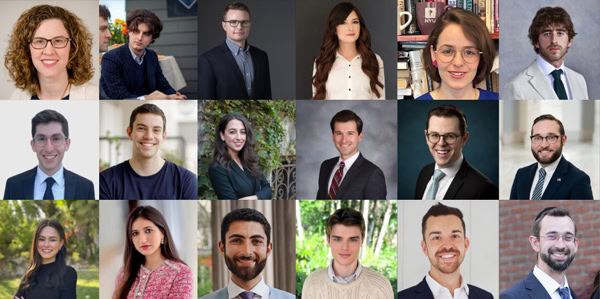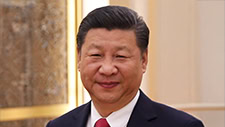Introducing Our 2023–2024 Krauthammer Fellows

As we enter the new year at Tikvah, we are thrilled to announce the 2023–2024 cohort of Krauthammer Fellows—18 young professionals who have excelled in the academy, the rabbinate, law, journalism, policy, and related fields.
In recent years, writing by Krauthammer Fellows has been featured in the Wall Street Journal, the Harvard Journal of Law & Public Policy, National Affairs, National Review, Commentary, First Things, Mosaic, and a wide range of other distinguished outlets. Their work has been cited before the Supreme Court and on flagship podcasts, and it has informed seminal debates—over the future of the BDS movement, Israel’s alliances in Asia, and global anti-Semitism, among many other critical issues.
Named for the late Charles Krauthammer—preeminent intellectual journalist and staunch defender of America, Israel, and the Jewish people—the part-time, year-long Fellowship is designed to support exceptional early-career individuals in bringing their ideas before the public, by publishing significant long-form writing on Jewish thought and history, modern Israel, and American governance and civic life.
In his final column for the Washington Post, in June 2018, Charles Krauthammer wrote of his belief “that the pursuit of truth and right ideas through honest debate and rigorous argument is a noble undertaking,” and of his gratitude “to have played a small role in the conversations that have helped guide this extraordinary nation’s destiny.” It is in this spirit—of pursuing truth through conscientious and rigorous argument—that the Krauthammer Fellowship was established in 2019, shortly after his passing.
To learn more about the Fellowship’s aims and structure, please visit the Krauthammer Fellowship website. Key essays by past Fellows are featured below. We look forward to sharing the work of our new Fellows with you over the course of the year.
 “Why and How to Revive American Anti-Communism,” Gary Dreyer, Commentary
“Why and How to Revive American Anti-Communism,” Gary Dreyer, Commentary
Gary Dreyer argues for the necessity of public education about the crimes of Communism. “With little conception of what the alternative to liberal democratic capitalism is and what the rhetoric of unhinged ‘social justice’ and ‘decolonization’ means in practice, an entire generation of Americans has now entered public life and the voting booths with an understanding of the world that is a mile wide and an inch deep,” Dreyer writes.
 “China’s new security architecture for the Middle East,” Tuvia Gering, Atlantic Council
“China’s new security architecture for the Middle East,” Tuvia Gering, Atlantic Council
Tuvia Gering authored a report addressing China’s engagement in the Middle East and North Africa. He argues that Beijing’s interests are no longer limited to energy security and economic ties, and that the United States must “promote the agency of regional partners and allies by encouraging them to clarify to Beijing that they will not participate in Chinese initiatives that compromise the US-led security architecture,” among other policy recommendations.
 “Boycotts: A First Amendment History,” Josh Halpern, Harvard Journal of Law & Public Policy
“Boycotts: A First Amendment History,” Josh Halpern, Harvard Journal of Law & Public Policy
Writing with Lavi Ben Dor, Josh Halpern defends the anti-boycott laws enacted by more than half of U.S. states to prevent entities from receiving public funds if they boycott the state of Israel. Halpern and Ben Dor conclude that “these laws reflect First Amendment progress, not decay.” Halpern’s work has been cited before the Supreme Court.
Below is a selection of additional articles published in 2022–2023 by Krauthammer Fellows.
“Growing Old in America”
Aaron Bondar, National Affairs (2023)
“Originalism as Intellectual History”
Elias Neibart, Harvard Journal of Law and Public Policy (2023)
“The Dangers of Inclusion Above All Else”
Tal Fortgang, Commentary (2023)
“Reclaiming the Classical Sephardic Tradition: Tracing Its Origins and Evolution”
Avi Garson, Lehrhaus (2023)
“Herzl Before Herzl”
Aaron Schimmel, Mosaic, (2023)
“Hyperinflation in the Lodz Ghetto”
Joshua Blustein, Studies in Applied Economics (2022)
“Who is Disraeli?”
Georgia L. Gilholy, The Critic (2023)
“What Ukraine Can Teach a Conservative”
Cole S. Aronson, National Review (2023)
“Paul Johnson, Philo-Semite”
J.J. Kimche, First Things (2023)